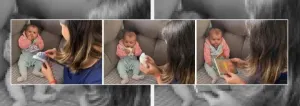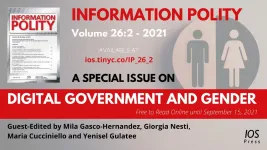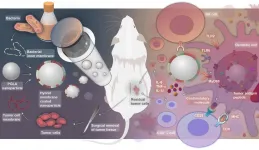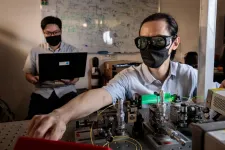(Press-News.org) Newborn infants and babies aged up to three months should be stimulated to manipulate objects and observe adults performing everyday tasks. This incentive helps their social, motor and cognitive development, researchers note in an article published in the May 2021 issue of the journal Infant Behavior & Development.
According to the authors, from the earliest age babies watch adults carrying out activities such as handling utensils and putting them away in drawers or closets. They should themselves have frequent contact with objects to develop the ability to hold things and reach out for them. Through social interaction, even newborns can learn to use their own bodies functionally and to perceive the links between their movements and their surroundings.
“We present evidence that neonatal imitation and manipulation activities are connected, and therefore propose stimulation practices based on seminal experimental designs where infants should be positioned in favorable postures to observe others acting in the world. This will have an impact on the way that early infants understand the social world and the chain of actions possible in this environment,” they argue in the article.
The study was supported by FAPESP in partnership with the Maria Cecília Souto Vidigal Foundation (FMCSV).
For Priscilla Ferronato, a professor at the Health Sciences Institute of Paulista University (UNIP) in São Paulo, Brazil, and first author of the article, the study innovated by evidencing the link between social imitation and the motor system underlying manipulation. “Research published since 1970 has shown that babies can copy facial expressions as soon as they’re born. We suggest they imitate manipulative motor actions just as much as expressions. When babies see adults using their hands, they copy the movements, and this helps them use their own hands,” she said.
Babies are unable to reach for objects in the first three months of life. “Carers usually stimulate them to use their hands only after they learn the reaching movement,” she said. “We propose the opposite: encouraging them to reach out before they can do so of their own accord.”
In the article, the researchers present a review of the scientific literature on the subject and advocate a novel approach to the understanding of imitation and manual activities. The suggestions are based on the reproduction of scenarios that replicate experimental situations in classic studies of child development but are simple and easily adapted.
One of the exercises proposed consists of placing the baby’s hands first on a smooth surface and then on an object with a rough surface to induce an awareness of the difference involved in terms of grasping and holding. Another is offering a finger for the baby to hold and smiling to reinforce the association between touch and visual stimulus.
A third proposal entails shining a flashlight or smartphone in a dimly lit room just above the baby’s chest to stimulate use of the arms as the baby tries to seize the beam of light.
“We want this information to be made available to professionals in daycare centers for practical application, and also to parents because at this early age babies are usually at home. Many parents have no idea babies are capable of learning in the first two or three months of their lives,” Ferronato said.
Last year the foundation published a book on interaction between parents or carers and infants (Primeiríssima Infância – Interações: Comportamentos de pais e cuidadores de crianças de 0 a 3 anos), according to which 21% of parents interviewed said children start learning after the age of 6 months, while the same percentage thought the threshold was 1 year. Most of the 58% who answered that babies learn in the womb or start learning shortly after birth had a university degree and were relatively well-off.
Developing skills
Early childhood is defined in Brazilian law as the first six years of a person’s life (Lei 13257/2016). Researchers and organizations often define infancy as the first three years of life. Around 10 million children can be classed as infants under this definition, according to data from the 2019 Continuous National Household Sample Survey (PNAD) conducted by IBGE, Brazil’s national census bureau.
The first 1,000 days, from conception to the child’s second birthday, are considered the most important from the standpoint of physical and mental development. What happens in this period can determine countless factors in adulthood. Sometimes referred to as the “golden days”, they are also crucial for learning because of the brain’s plasticity.
In February, FAPESP launched the Brazilian Center for Early Child Development in partnership with FMCSV. The Center is hosted by INSPER, a business school in the city of São Paulo. Its goals include conducting research on early childhood and child development, integrating data on the subject from different sources, and offering courses and workshops (more at: agencia.fapesp.br/35199).
INFORMATION:
About São Paulo Research Foundation (FAPESP)
The São Paulo Research Foundation (FAPESP) is a public institution with the mission of supporting scientific research in all fields of knowledge by awarding scholarships, fellowships and grants to investigators linked with higher education and research institutions in the State of São Paulo, Brazil. FAPESP is aware that the very best research can only be done by working with the best researchers internationally. Therefore, it has established partnerships with funding agencies, higher education, private companies, and research organizations in other countries known for the quality of their research and has been encouraging scientists funded by its grants to further develop their international collaboration. You can learn more about FAPESP at http://www.fapesp.br/en and visit FAPESP news agency at http://www.agencia.fapesp.br/en to keep updated with the latest scientific breakthroughs FAPESP helps achieve through its many programs, awards and research centers. You may also subscribe to FAPESP news agency at http://agencia.fapesp.br/subscribe.
Diabetes is the leading cause of kidney failure in the United States, but identifying type 1 or type 2 diabetes patients at high risk for progressive kidney disease has never had a sure science behind it.
Historically, assessing kidney function meant looking at estimated glomerular filtration rate, a calculation that determines how well blood is filtered by the kidneys, and urine albumin excretion, a urine test to detect the amount of the protein albumin, which is filtered by the kidneys. However, both tests have limited predictive power in early stage diabetes when kidney function is normal.
The therapeutic approach to both type 1 and type 2 diabetic ...
A multi-institutional study has discovered spontaneous mutations in RNF2 (RING2) gene as the underlying cause of a novel neurological disorder. This Undiagnosed Diseases Network (UDN) study was led by Dr. Shinya Yamamoto, investigator at the Jan and Dan Duncan Neurological Research Institute (NRI) at Texas Children's Hospital and assistant professor at Baylor College of Medicine, and Dr. Vandana Shashi at Duke University Medical Center. Using a combination of comprehensive clinical tests, trio genome sequencing and functional studies in the fruit flies, and global gene matchmaking efforts, the teams found ...
Amsterdam, July 8, 2021 - While the literature on the digital divide has widely addressed the digital gender gap, its potential implications for electronic government (e-government) / digital government research and practice have hardly been studied. In this Special Issue of Information Polity experts characterize the current state of understanding of the issues surrounding digital government and gender and present an agenda for future research.
Gender is a neglected topic in the literature on digital government. According to the International Telecommunications Union, women are lagging behind men in making ...
demic have already had a dramatic impact on the prevailing oral health care model and will continue to do so. The paper "Advocacy for a Digital Oral Health That Leaves No One Behind," published in the JDR Clinical & Translational Research (JDR CTR), promotes the use of digital tools to offer opportunities to improve healthy behavior, lower risk factors common to oral diseases and other noncommunicable diseases and contribute to reducing oral health inequalities.
To mitigate the impact of the COVID-19 pandemic lockdowns, systems were quickly put in place in most countries to respond to dental emergencies, ...
Consuming a protein supplement, specifically protein hydrolysate, during carbohydrate-restricted training was helpful for improving training intensity in women, but not in men.
That's according to new research which will be part of a presentation this week at The Physiological Society's Annual Conference Physiology 2021.
Most nutrition guidelines for athletes are based on research in men only. This study, by Tanja Oosthuyse and her colleagues, emphasizes that this shouldn't be the case, because nutritional research findings in men don't always apply to women.
While the protein supplement helped training intensity in women, it did not improve training intensity and instead resulted in modest negative effect in men. It made exercise ...
July 8, 2021 - Women with recurrent urinary tract infections (UTIs) experience frustration related to their treatment - particularly the risks from repeated use of antibiotics, according to a focus group study in The Journal of Urology®, Official Journal of the American Urological Association (AUA). The journal is published in the Lippincott portfolio by Wolters Kluwer.
"This study was prompted by our experience treating countless women with recurrent UTIs referred to our specialized Female Pelvic Medicine and Reconstructive Surgery center," comments senior author Ja-Hong Kim, MD, of UCLA Center of Women's Pelvic Health. "The vast majority were understandably dissatisfied with their care pathway, which was primarily antibiotic-focused ...
Ibaraki, Japan - Most kids dream of growing up to be astronauts; but the downside of spending extended amounts of time in low gravity is that astronauts' muscles tend to shrink and weaken through disuse. Now, researchers from Japan have identified a protein that affects how muscles respond to space flight.
In a study published in June 2021 in Communications Biology, researchers from the University of Tsukuba have revealed that nuclear factor E2-related factor 2, or NRF2, helps keep muscles from becoming weak in low gravity.
Muscle atrophy, or weakening, is a common feature of disease and aging. It can also occur after a long period of inactivity, such as during space flight, when astronauts don't need to use their muscles as much as they do on Earth to support ...
Thanks to the rapid development of nanotechnology, a research team led by Profs. NIE Guangjun, WU Yan and ZHAO Yuliang from the National Center for Nanoscience and Technology (NCNST) of the Chinese Academy of Sciences (CAS) recently designed personalized tumor vaccines based on bacterial cytoplasmic membranes and cell membranes from resected tumor tissue. This work was published in Science Translational Medicine.
Cancer vaccines are an effective anti-tumor therapeutic option that utilize tumor antigens to stimulate patients' immune response and specifically kill tumor cells. Postoperative recurrence and metastasis after surgery can thus be effectively inhibited by the activated immune system. Therefore, ...
Quantum key distribution (QKD) is a method for secure communication that uses quantum mechanics to encrypt information. While the security of QKD is unbreakable in principle, if it is incorrectly implemented, vital information could still be stolen by attackers. These are known as side-channel attacks, where the attackers exploit weaknesses in the setup of the information system to eavesdrop on the exchange of secret keys.
Researchers from the National University of Singapore (NUS) have developed two methods, one theoretical and one experimental, to ensure that QKD communications cannot be attacked in this way. The first is an ultra-secure cryptography protocol that can be deployed in any communication network that needs long-term ...
Researchers at the National Human Genome Research Institute (NHGRI), part of the National Institutes of Health (NIH), have developed the Families Sharing Health Assessment and Risk Evaluation (SHARE) workbook, which helps people use their family history to assess their risk for heart disease, diabetes, breast cancer and colorectal cancer.
Since 2012, Laura Koehly, Ph.D., and her research team have measured the accessibility and usability of the workbook by working with communities and continually updating the workbook to address issues. Koehly is the chief of the Social ...



